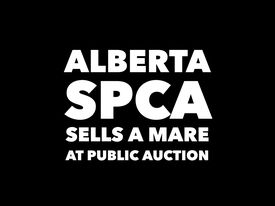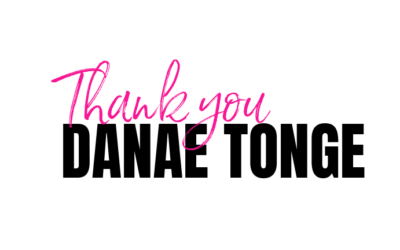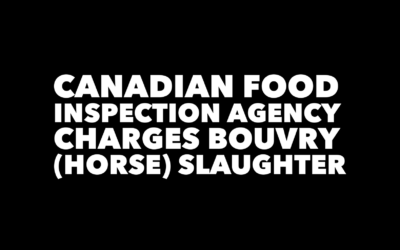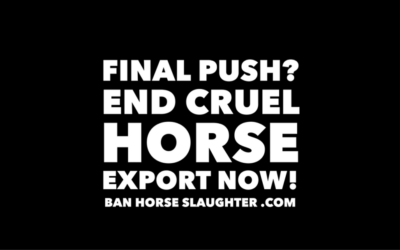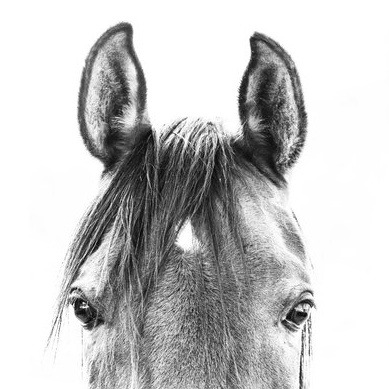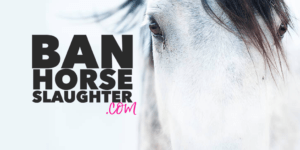CINDY THOMAS OF HORSE HEROES ALBERTA FINDS & BUYS A MARE “BELONGING” TO ALBERTA SPCA AT HORSE AUCTION
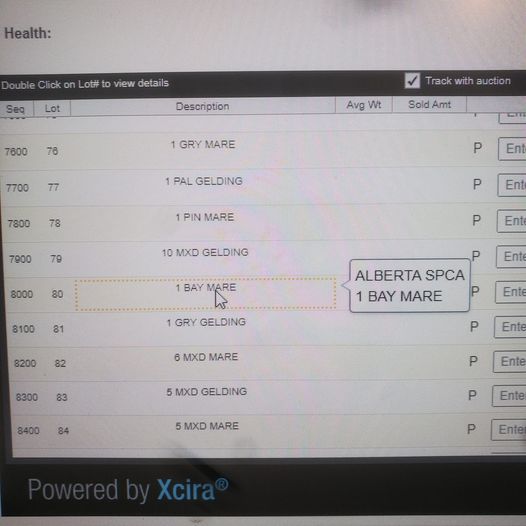
Chances are good that if you know anything about horse slaughter in Canada you’ve come across Cindy Thomas of Horse Heroes Alberta.
Multiple times per month for the last couple of years Cindy has attended horse auctions in Alberta, Canada — and since early 2019 she’s facilitated the rescue of over 550 horses from the slaughter pipeline.
Cindy’s goal is to save as many horses as she can by outbidding kill buyers AKA meat buyers at the auctions. She’s backed by an amazing group of people from across North America who regularly contribute to help offset the huge expenses of purchasing horses — and then properly caring for them, and owner surrendered horses – before they are carefully rehomed in permanent homes.
Recently Cindy and others were shocked to find a horse at an auction that was “marked” as being owned by the Alberta SPCA.
Of course most of us are completely outraged to hear that the SPCA sells horses at any auction because auctions are frequented by kill buyers who ship horses to slaughter for human consumption.
If you are like me, you believe that horses once in the care of the Alberta SPCA should be protected — they should be given a soft landing — they certainly shouldn’t be placed in harm’s way at an auction where they risk being transported to slaughter.
However, thanks to animal advocate Vivian Bell of Edmonton, Alberta I was reminded why some equines in the “care” of the SPCA do end up at a public auctions.
I tend to think of it as the SPCA arranging a “plea bargain” for those who neglect their equines.
Here’s just one example of why you may find horses at a public auction marked as being “owned” by the SPCA…
The SPCA may negotiate a deal with owners whose horses are neglected, a deal where the owners agree that if they are paid for their equines, they will agree to give them up — the SPCA is able to quickly take those equines away from further harm, they are able to avoid lengthy and expensive court cases.
But then the challenge is that in the past owners have taken the SPCA to court claiming that they have not received fair market value for their horses.
When the SPCA sells horses at a public auction, it makes it very difficult for a former owner to claim they did not receive “fair market value” for their horse and therefore very difficult to take legal action against the SPCA.
Thankfully in the case of the recent auction, Cindy Thomas and her Horse Heroes Alberta supporters were able to buy a mare marked as being sold by the SPCA — who might otherwise have gone to slaughter.
Antiquated laws in Canada force the SPCA to sell horses at public auctions to protect themselves from litigation.

Vivian Bell writes:
I spoke via email with the Alberta SPCA and here is a summary of how they are legally bound in this issue of seizure:
1) The SPCA are constantly sued after seizure cases and spend a great deal of money on litigating these cases.
It is disheartening to them to see how much owners are willing to pay to fight for money back on their “property”, when if they used that money to take care of the animals in the first place there never would have been seizure.
People are bizarre.
Years of experience in the courts have shown the SPCA how to best protect themselves from these attacks and to try to minimize the money spent on court cases so that more goes to physically helping animals.
2) It is apparently routine for owners of seized animals (the owners who do not sign over the animals to the SPCA and choose to fight legally) to vastly overestimate the value of their animals.
Experience has taught the SPCA that if they try and arrange private sales of seized animals, either to rescues or anyone, then they get accused by the owner of deliberately trying to rip them off and then they get sued.
The way to avoid this is public auction, it is open and transparent and then the difficult owner has no grounds for litigation.
3) Sometimes an owner admits to the SPCA they can no longer care for their animals and that they want to sell them.
If the owner no longer has the capacity to sell, then the SPCA steps in and removes the animals and then acts on the owners behalf to sell them if they wish at auction. In that case the SPCA are seen as villains. If the SPCA do not do this and leave the animals on the property, then they are seen as not acting to help the animals.
It’s tricky and they have to try and do their best within the law.
4) And this is the most important point – when there are no potential legal threats, then the SPCA is happy to gift horses, animals to rescues or placement partners to find homes for them.
This is often after the SPCA invests vet care, food, etc. in the animals and they ask nothing back in return.
So – the law needs to be changed to put animal welfare above property rights and protect the SPCA from market value challenges.
In the meantime, it is in everyone’s best interests, especially the horses and donkeys, to forge good working relationships between SPCA’s and rescue groups.
It can be beneficial to rescue groups because the SPCA with their larger resources can do the more expensive work of vet care, feed, assessment etc. before the equines are either gifted to rescues or when forced to, go to auction — with good working relationships between rescues and SPCA’s, be bought by rescues at auction.
Auctions will only be avoided in many cases if we get the law changed.

UPDATE:
Good morning Ms. Thomas,
Section 7 of the Animal Protection Act (APA) dictates that peace officers take legal custody of animals but the owners of animals retain a legal right to their animals or the value of those animals.
In broad terms I will explain how this applies to the work we do using a hypothetical situation.
If Alberta SPCA Peace Officers need to seize 100 head of cattle to relieve their distress, the owner is legally entitled to reclaim their animals and if the owners chooses not to reclaim then the proceeds, less the seizure costs, are paid to the owner of the animals.
That owner may believe the cattle are worth more than they are.
The owner may believe they’re worth $150,000 because that’s the current market price cattle are selling for.
However, because the cattle in question are not in ideal condition the market will not pay that amount.
When the animals are sold at auction the owner may only receive $100,000 and may allege he/she is owed more from the sale.
Section 14 of the APA protects our peace officers from legal actions brought against them provided they can demonstrate they acted in good faith.
Many, including yourself, have suggested we simply sell the animals to groups for slightly more than what a meat buyer would pay at auction.
However, imagine the situation above involving the hypothetical owner of the 100 cattle.
If we were to agree to sell the cattle for $100,000 to a group without benefit of a public sale the owner may assume we cut a deal to a favoured animal-related group instead of selling the cattle for his perceived full available price.
In a situation like that, the owner can allege we acted in bad faith and it would be difficult for our agency to prove otherwise.
We then are open to significant civil liability and punitive costs.
By selling them at auction we are being open and transparent and removing the appearance or perception of favouritism.
As a law enforcement agency, it is important we remain consistent in how we deal with the subject(s) of an investigation, and consistent in how we interact with other organizations, otherwise we risk litigation and the allegation of bad faith.
Our agency often finds itself in court to defend against allegations of bad faith and which often have little to nothing to do with the actual welfare of the animals in question.
It is disheartening how many subjects we deal with who choose to spend money to engage in costly court battles when they could have instead invested those funds into looking after their animals in the first place.
In the case of the two horses at the Rimbey auction, the horses were part of a file that involved several species of animals and due to legal considerations, all animals were dispersed in the same manner.
As the investigation into the case remains open, we cannot provide further details.
I hope this helps explain the circumstances and challenges we face when dealing with complicated and sensitive investigations.
Regards,
Dan Kobe
Communications Manager Alberta SPCA

You can help change the laws to better protect our beloved equines.
The rules and regulations that the SPCA has to follow in each province vary — but if like me you are appalled that the SPCA need to protect themselves by selling horses at public auctions to the highest bidder, even if that bidder is a kill buyer, then please join me in using the links below and contacting your provincial politicians who can change the antiquated policies.
Let’s take action to protect our beloved equines and other animals. ~ Marie

T-SHIRTS IN SUPPORT OF HORSE RESCUE FUND
LIMITED TIME OFFER FREE SHIPPING CANADA & USA
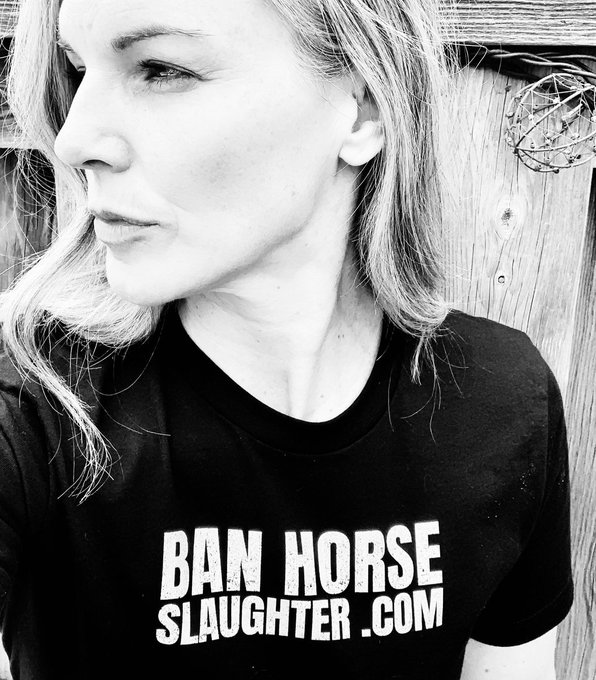
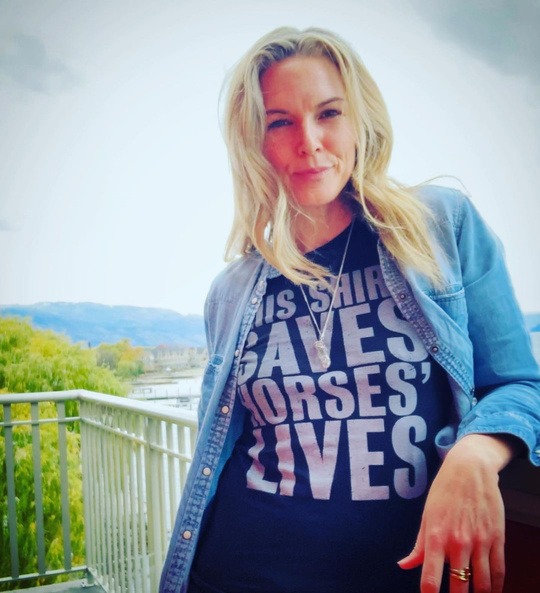
CANADA SLAUGHTERS HORSES FOR HUMAN CONSUMPTION
It may be hard for some to believe that tens of thousands of horses, including pets, are routinely slaughtered in Canada, for human consumption.
Some of the meat is consumed in Canada and much of it is shipped to the European Union and other markets, including Japan.
The barbaric slaughter of horses is currently not legal in the United States, BUT horses, including pets and ex-racehorses, from the United States are shipped to Canada and to Mexico to be slaughtered.
In addition Canada allows for the transportation of live horses to Japan, to be slaughtered for human consumption, and unfortunately the transportation of horses destined for slaughter within Canada, and by air, is far from humane.
DANAE TONGE
DANAE OF MANITOBA ANIMAL SAVE STRIKES AGAIN!Okay, you'll recognize Danae Tonge from at least one video we've featured many times... A CBC National News broadcast covering the inhumane live export of horses from Canada by air for the purpose of slaughter in Japan (and...
CANADIAN FOOD INSPECTION AGENCY CHARGES BOUVRY
COURT DATES JANUARY 6 - 17, 2025 DECEMBER 13, 2024: We continue to hear that Bouvry in Fort MacLeod has closed. That rumour, a misinterpretation of a post by a well known and much respected by us group persists. The main FEEDLOT - which is not adjacent to the plant...
CONTACT SENATE AG COMMITTEE
YOU CAN HELP PASS BILL C-355First published Dec. 12, 2024. Updated Dec. 21, 2024. Okay, we know, we know, you've signed and shared petitions including multiple Member of Parliament sponsored e-petitions - THANK YOU. [Those e-petions went a long way to getting Bill...

